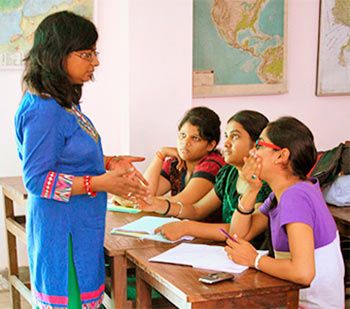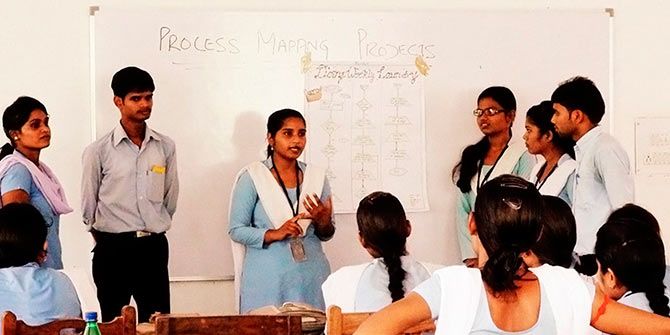Christopher Turillo and Byomkesh Mishra believe that by training the youth in industry relevant skills, they can prepare them for better jobs.
Their organisation Medha aims to improve the quality of employability in the country. This is their story.
 Medha is an organisation created with the idea of bringing in better employment opportunities and life for educated youth.
Medha is an organisation created with the idea of bringing in better employment opportunities and life for educated youth.
It was founded by Christopher Turillo and Byomkesh Mishra.
"I first came to India 15 years ago as a college student. While staying with a Tibetan family in Dharamshala, I saw the impact income generating loans could have on families from low-income backgrounds.
"After completing my BA in the US, I worked hard to find opportunities to return to work in the micro finance sector in India.
"In 2005, I was selected as a William J. Clinton Fellow for Service in India as part of American India Foundation and was placed with SKS Microfinance in Hyderabad. That is where I met Byomkesh, the co-founder of Medha.
"As a rapidly growing organisation, we were hiring between 200 to 300 loan officers on a monthly basis from the rural areas where we were operating.
"With just a 10th pass education and limited training on our MIS and financial accounting, these young professionals grew rapidly within the company and were quickly managing portfolios of 500-800 clients and Rs 50 Lakh to 1 crore loans.
"We started thinking about the social and economic impact the organisation was having through wage employment and job creation, as much as the Rs 10,000 income generating loans we were providing. This idea stuck with us," says Turillo.
The beginning
The idea took a couple of years to take root.
Christopher moved back to the US to complete a MBA/MA from the University of Chicago Booth School of Business and Johns Hopkins School of Advanced International Studies and Byomkesh moved back up to North India to lead a financial inclusion programme for the Royal Bank of Scotland Foundation.
Over the years, the duo would get together, brainstorm about potential ideas, and in 2009 they authored a report on the overall employability training space in the country.
"During graduate school, I interned with organisations like IDFC Private Equity, Sequoia Capital, and Nav Bharat Jagriti Kendra to get a better understanding of industry demand, the overall employability ecosystem, and also learn the ins and outs of the funding landscape. Through our research, we started to identify three significant challenges in the overall skilling space --
- Intermediaries: Most of the existing training providers were stand-alone institutes, with their own facilities and in turn high capital costs. They struggled to mobilise students and were focused on quantity not quality.
- Industry-aligned: Most successful training providers had grown on the backs of a booming industry. However, a growing economy like India, these industries tend to boom and bust, leaving students with few transferable and marketable skills beyond their industry domain.
- Classroom-based: While instruction quality is generally better at some of the top training institutes, they still primarily engage in lecture-based teaching instruction. This fails to equip students with the ‘real-world’ skills that are required to succeed on the job. With these findings in place, Byomkesh and Chris set out in 2011 to build a program that addressed these key challenges.
"We did three things to work around with these challenges. First, we were committed to working within the existing education system, setting up Career Service Centres on campuses at government and government-aided degree colleges.
Next, we built a curriculum based on industry feedback that imparted basic skills like digital literacy, communication and life skills, and career services that could be applied to a number of industries.
"Finally, we incorporated an on-the-job training (internship) component into the programme, mandatory for all students to receive a certificate," Turillo said.
The Hurdles
 While the plan was in place, they faced significant challenges in the initial years.
While the plan was in place, they faced significant challenges in the initial years.
While they were aiming for a target of working with 300 students in the first year, they were able to work with just twenty four students at one college.
Out of the 25 colleges that they approached in 2011, only one agreed to let them run their programme.
To make matters worse, they were given only two hours of classroom time in the afternoon, after most students had already gone home.
Despite this, they moved forward with the program and ended up placing all 24 students into internships and over 50 per cent of them converted into full-time job offers.
However, in late 2012, Medha got the break they were looking for.
A mutual contact helped them get a meeting with the Chief Secretary of Uttar Pradesh and they were granted a meeting with the Principal Secretary of Higher Education.
He gave them access to one government degree college in Lucknow, and they quickly mobilised to set up a Career Service Centre there.
Setting the path
In 2013-2014 they trained over 57 students across three colleges, thus doubling their previous years output.
"We were making incremental progress but it was slow going. We knew the results were strong and the value to students was high, but if we weren’t able to significantly increase our presence it would be difficult to continue," Turillo said.
With that in mind, they decided to focus on outreach in 2014, introducing a short-term programme (Career Advancement Bootcamp) as an entryway into new campuses, and converting all of their existing college partnerships from ‘after school programs’ into full-time career service centres.
"It has had a huge effect. We went from 57 students across three colleges to over 400 students across 10 colleges in 2014 -2015. As a result, the Government of Uttar Pradesh has given us access to 15 additional institutions in the upcoming academic year (10 degree colleges and 5 polytechnics) across seven districts in Eastern Uttar Pradesh,” said Byomkesh.
Way forward

With recent support from large foundations like The Michael and Susan Dell Foundation and EdelGive Foundation, Medha is expanding across the state and plans to work with 1,500 students next year across 25 institutions, and has ambitious plans to reach 20,000 students by the end of 2018.
In addition to geographic expansion, they are looking at ways to incorporate eLearning into their existing programme, build a stronger business around their employer relations function for greater sustainability, and conduct a scientific study on not only the employment outcomes they are having but also the social and gender related impact as a result of working with primarily young women from extremely disadvantaged backgrounds.
"We know there are a number of new challenges that lie ahead. Expanding outside of Lucknow this year is extremely exciting and brings a lot of opportunities, but at the same time we have a lot to learn about the employment landscape in smaller cities and towns across UP.
"In addition -- hiring, training, and managing a much larger team to achieve these lofty goals comes with it's own set of unique challenges.
"We work on employability issues in this part of the country for a reason -- there is a significant need here -- as a growing organisation ourselves, we are now feeling that need more than ever before.
"Our vision has always been to mainstream our innovation into the existing public sector education system.
"We have a long way to go, but are encouraged by our growing partnership with the Government of Uttar Pradesh and the impact we continue to have on the lives of our students and alumni," Turillo added.











